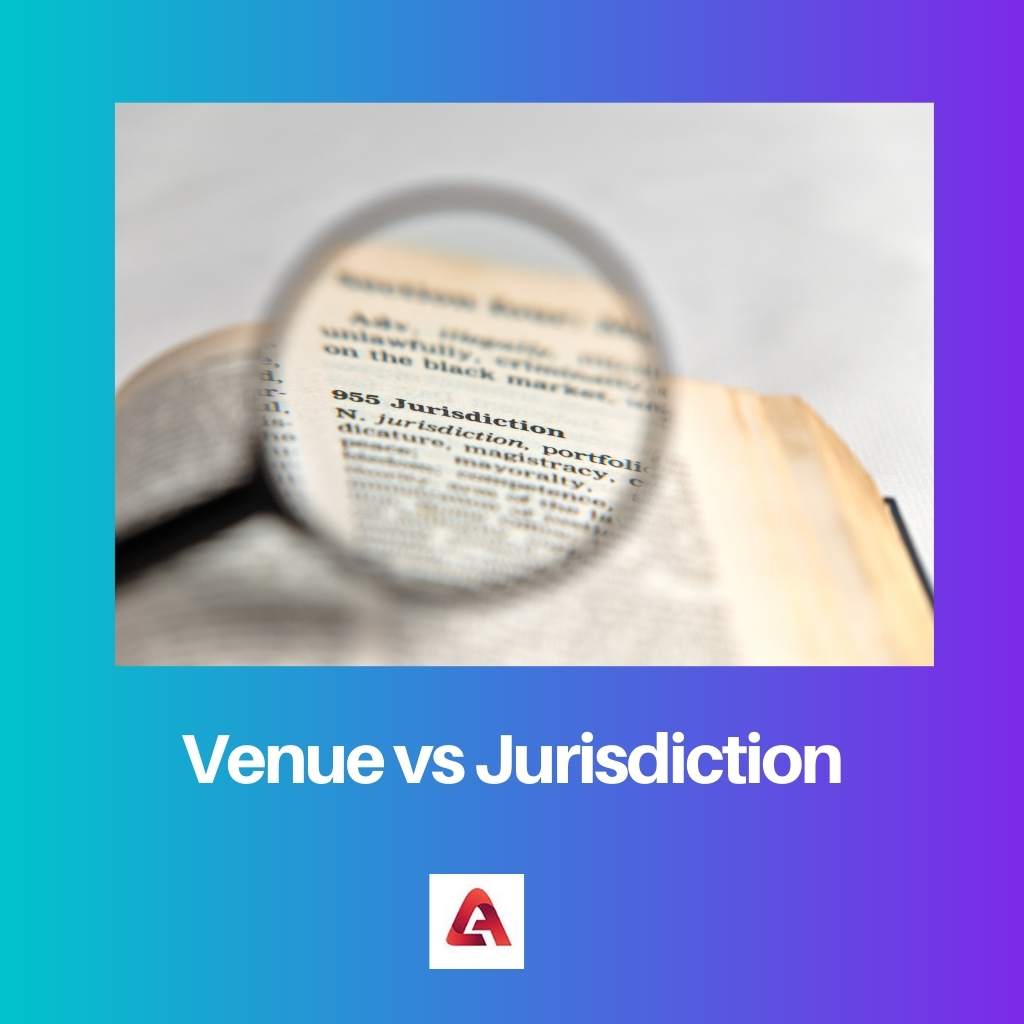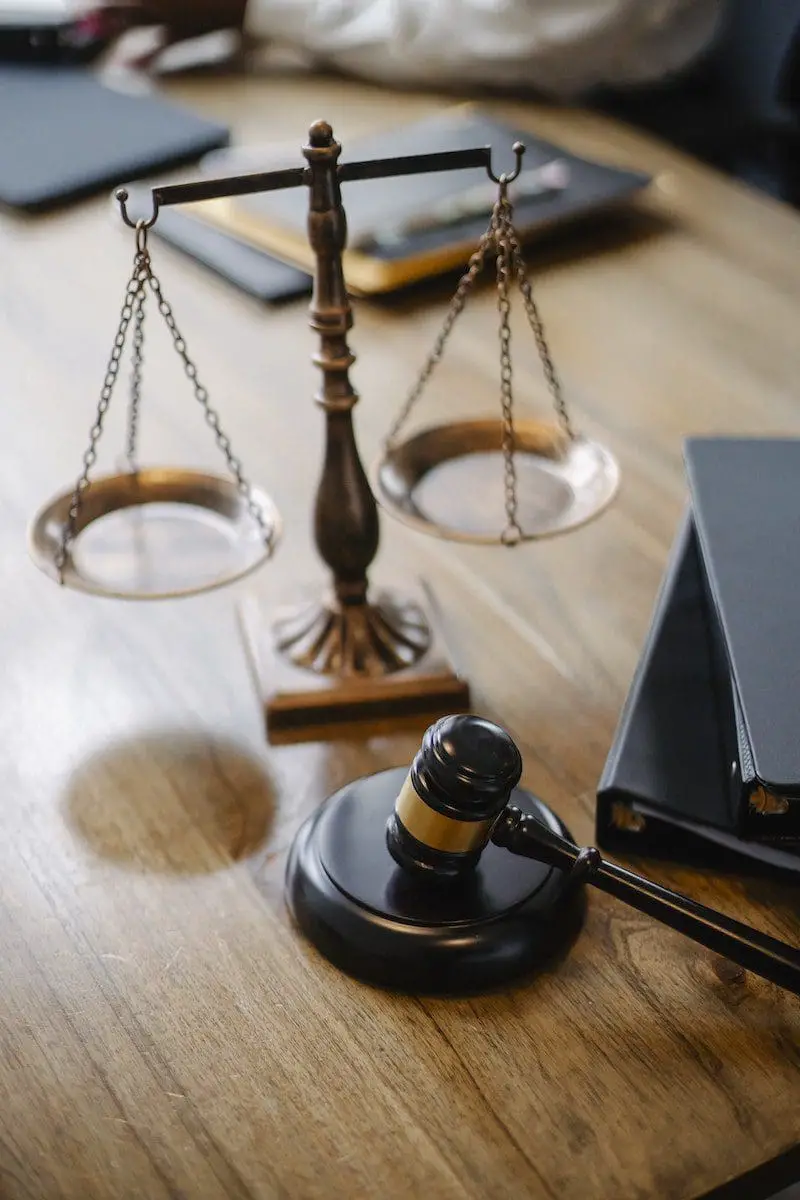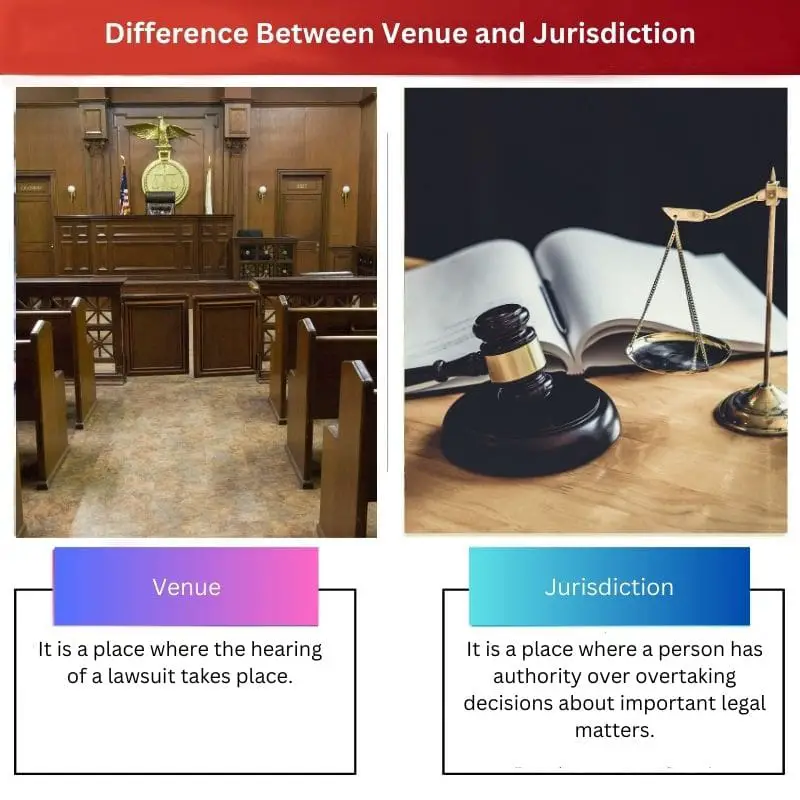The terms venue and jurisdiction are two words that are related to law. Both have legal meanings to them. Venue and jurisdiction, both in contrary terms, speak of a Specific place.
Since both these people’s words are related to law and place, many people have a big confusion about the meaning of both. But they have differences in their meanings and characteristics.
Key Takeaways
- Venue refers to the specific geographic location where a legal case is heard in court.
- Jurisdiction refers to the court’s authority to hear a particular case based on factors such as the subject matter, the parties’ location, and the type of legal claim.
- Choosing the correct venue is essential for ensuring convenience and fairness for both parties, while determining jurisdiction is crucial for assessing the validity of a legal case.
Venue vs Jurisdiction
A venue is a place where the hearing of the case will be conducted. It must be decided based on legal terms, thus keeping in view the easiness of both parties. Jurisdiction refers to the authority of someone over something. It can be a place, region, or authority over a person, etc.

The term venue is the place where the case of a party is heard in a court. It is always considered that a venue is supposed to be a country or a district, or a state. It can never be any small village or place. The term venue is the place where a lawsuit heating will be held.
The term Jurisdiction is a place to which authority is granted a person or a body for dealing with legal matters of the state or country. It can also be the political leader for which this jurisdiction is authorized.
The word jurisdiction is derived from the Latin words Juris, which means to oath, and dicere, which means to speak.
Comparison Table
| Parameters of Comparison | Venue | Jurisdiction |
|---|---|---|
| Meaning | It is a place where the hearing of a lawsuit takes place. | It is a place where a person has authority over overtaking decisions about important legal matters. |
| Waiver | It can be waived | It cannot be waived. |
| Characteristic | It is a geographic location. | It is more than just a geographic location. |
| Location | It can be any area under a state, a country or even a district. | This should fall under the court while giving a hearing. |
| Type | There are no different types in the venue. | Personal jurisdiction, territorial jurisdiction and subject matter jurisdiction are three types of jurisdictions present. |
What is Venue?
The term venue is the place where the case of a party is heard in a court. It is always considered that a venue is supposed to be a country or a district, or a state. It can never be any small village or place. The term venue is the place where a lawsuit heating will be held.
The venue is the place where it is decided to file a lawsuit. It has to be to the knowledge of every person that the venue where the lawsuit is going to take place can be waived off by the person in opposition at the time of a trial that will take place.
A Plaintiff is also capable of giving the waiving of the venue at the time of a trial. A venue change can occur in a criminal and a civil case.
The only difference between both is that the in a civil case, the venue can be helpful in a place where it is changed only when neither of the party lives or holds their business there, and on the other hand, in a criminal case, there is asked for a change in a venue because witness wants a jury that may be I his support.

What Is Jurisdiction?
The term Jurisdiction is a place to which authority is granted a person or a body for dealing with legal matters of the state or country. It can also be the political leader for which this jurisdiction is authorized.
The word jurisdiction is derived from the Latin words Juris, which means to oath, and dicere, which means to speak.
Jurisdiction can be defined as a place where a person can hold authority and point an authority at that place. This means in this place, and there is access for authority being exercised and granted both.
This is exactly why a person would observe a police officer saying this area is not under their jurisdiction.
Jurisdiction consists of three main parts: personal jurisdiction, subject matter jurisdiction, and territorial jurisdiction. When someone has authority over some other person, then that is called personal jurisdiction.
When authority is related to a place, then it is called territorial jurisdiction, and finally, any authority over a subject is called subject matter jurisdiction. Jurisdiction is also capable of defining the authority of a court.

Main Differences Between Venue and Jurisdiction
- A venue is a place where the hearing of a lawsuit is taking place, and on the other hand, a jurisdiction is a place where a person holds authority over it to make decisions regarding legal matters.
- A plaintiff or defender can waive off a venue on the day of the hearing; on the other hand, a party cannot waive the place of jurisdiction.
- A venue can be any state, country, or district, and on the other hand, a jurisdiction is a place that falls under a court while making a hearing.
- There is only one type of venue; on the other hand, there are three types of jurisdiction which are personal, territorial, and subject matter jurisdictions.
- A venue is initially just a geographic location; conversely, jurisdiction is based on more than just a geographic component.

- https://heinonline.org/hol-cgi-bin/get_pdf.cgi?handle=hein.journals/clqv66§ion=27
- https://search.informit.org/doi/abs/10.3316/agispt.20190828016175

This article provides a comprehensive understanding of venue and jurisdiction. Well-researched and well-articulated.
Absolutely, Julie. The detailed explanations are extremely helpful for those navigating the legal system.
This article offers an illuminating comparison between venue and jurisdiction. A great resource for legal studies.
Indeed, Sclarke. This article provides a nuanced understanding of the legal significance of venue and jurisdiction.
I found the detailed explanations of venue and jurisdiction to be highly beneficial.
The informative content and clear comparisons between venue and jurisdiction make this article a notable resource for legal education.
Absolutely, Courtney. The depth of this analysis is commendable.
I believe the post clearly explains the significance of both venue and jurisdiction in the legal process.
Absolutely, Davis. It’s a valuable guide for those looking to enhance their legal knowledge.
I agree, Davis. The post effectively breaks down the meaning and differences between venue and jurisdiction.
The breakdown of venue and jurisdiction in this article is a valuable aid for anyone seeking clarity on these legal concepts.
I couldn’t agree more, Andy. This article greatly contributes to the understanding of these legal principles.
Spot on, Andy. This is a well-crafted explanation of key legal terms that are misunderstood.
The detailed breakdown of venue and jurisdiction is educational for someone like me who is not well-versed in legal terminology.
I agree, Pete. This article serves as a valuable resource for individuals outside the legal field to understand these concepts.
An important read for anyone interested in the legal domain. The clear distinctions between venue and jurisdiction are well-articulated.
Absolutely, James. The article does a great job of clarifying the nuances between these legal concepts.
I completely agree, James. Understanding these legal terms is essential for legal practitioners.
I appreciate the thorough analysis of both venue and jurisdiction in this article.
Agreed, Rebecca. The depth of insight provided here is commendable.
This article effectively addresses the confusion surrounding venue and jurisdiction.
Very informative article! It’s important to make the distinction between these two legal terms.
I completely agree, Taylor. Understanding the differences between venue and jurisdiction is crucial in the legal field.
I found the comparison table really helpful in distinguishing the characteristics of venue and jurisdiction.
Yes, Sophie, it provides a clear overview of the key differences between these two legal concepts.
Great summary of the differences. It’s essential for legal professionals and law students to understand these concepts thoroughly.